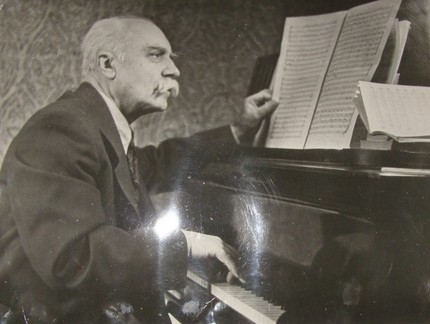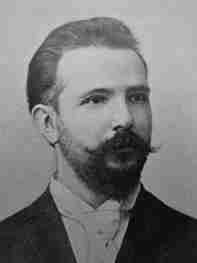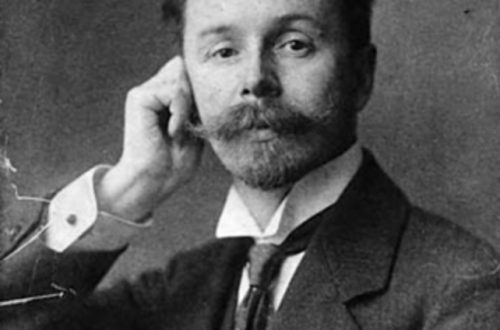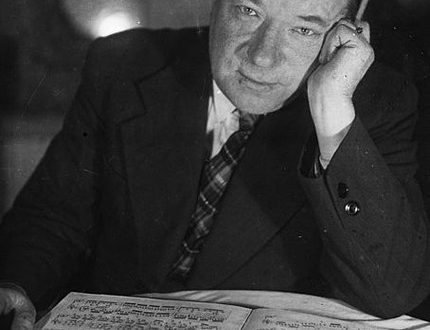
Lev Nikolayevich Revutsky |
Lev Revutsky

An important stage in the history of Ukrainian Soviet music is associated with the name of L. Revutsky. The composer’s creative heritage is small – 2 symphonies, a piano concerto, a sonata and a series of miniatures for pianoforte, 2 cantatas (“Handkerchief” based on T. Shevchenko’s poem “I didn’t walk on Sunday” and the vocal-symphonic poem “Ode to a Song” based on M. Rylsky’s verses) , songs, choirs and over 120 adaptations of folk songs. However, it is difficult to overestimate the composer’s contribution to the national culture. His concert was the first example of this genre in Ukrainian professional music, the Second Symphony laid the foundations of Ukrainian Soviet symphony. His collections and cycles of adaptations significantly developed the traditions laid down by such folklorists as N. Lysenko, K. Stetsenko, Ya. Stepova. Revutsky was the initiator of the processing of Soviet folklore.
The heyday of the composer’s work came in the 20s. and coincided with a period of rapid growth of national identity, active study of its historical and cultural past. At this time, there is an increased interest in the art of the 1921th century, imbued with the spirit of anti-serfdom. (especially to the work of T. Shevchenko, I. Franko, L. Ukrainka), to folk art. In 1919, a music and ethnographic office was opened in Kyiv at the Academy of Sciences of the Ukrainian SSR, collections of folk songs and folklore studies by leading folklore scholars K. Kvitka, G. Verevka, N. Leontovich were published, and music magazines were published. The first republican symphony orchestra appeared (XNUMX), chamber ensembles, national musical drama theaters were opened. It was during these years that the aesthetics of Revutsky was finally formed, almost all of his best works appeared. Deeply rooted in the richest folk art, Revutsky’s music absorbed his special sincere lyricism and epic breadth, emotional brightness and brilliance. She is characterized by classical harmony, proportionality, bright optimistic mood.
Revutsky was born into an intelligent musical family. Concerts were often held at home, at which the music of I, S. Bach, W. A. Mozart, F. Schubert sounded. Very early the boy got acquainted with the folk song. At the age of 5, Revutsky began to study music with his mother, then with various provincial teachers. In 1903, he entered the Kyiv School of Music and Drama, where his piano teacher was N. Lysenko, an outstanding composer and founder of Ukrainian professional music. However, the interests of Revutsky in his youth were not limited only to music, and in 1908. he entered the Faculty of Physics and Mathematics and the Faculty of Law of Kyiv University. In parallel, the future composer attends lectures at the RMO Music School. During these years, there was a strong opera troupe in Kyiv, which staged Russian and Western European classics; symphonic and chamber concerts were systematically held, such outstanding performers and composers as S. Rachmaninov, A. Scriabin, V. Landovskaya, F. Chaliapin, L. Sobinov toured. Gradually, the musical life of the city captivates Revutsky, and, continuing his studies at the university, he enters the conservatory that opened on the basis of the school in the class of R. Gliere (1913). However, the war and the evacuation of all educational institutions connected with it interrupted the systematic studies. In 1916, Revutsky graduated from the university and the conservatory at an accelerated pace (two parts of the First Symphony and several piano pieces were presented as a thesis work). In 2, he ends up on the Riga front. Only after the Great October Socialist Revolution, returning home to Irzhavets, did the composer get involved in creative work – he wrote romances, popular songs, choirs, and one of his best compositions, the cantata The Handkerchief (1917).
In 1924, Revutsky moved to Kyiv and began teaching at the Music and Drama Institute, and after its division into a theater university and a conservatory, he moved to the department of composition at the conservatory, where, over many years of work, a whole constellation of talented Ukrainian composers left his class – P and G. Mayboroda, A. Filippenko, G. Zhukovsky, V. Kireyko, A. Kolomiets. The composer’s creative ideas are distinguished by breadth and versatility. But the central place in them belongs to the arrangements of folk songs – comic and historical, lyrical and ritual. This is how the cycles “The Sun, Galician Songs” and the collection “Cossack Songs” appeared, which occupied a key place in the composer’s legacy. The deep folklore richness of the language in organic unity with the creatively refracted traditions of modern professional music, the clarity of melody close to folk songs, and poetry became the hallmarks of Revutsky’s handwriting. The most striking example of such an artistic rethinking of folklore was the Second Symphony (1927), the Piano Concerto (1936) and the symphonic variations of Cossack.
In the 30s. the composer writes children’s choirs, music for film and theater productions, instrumental compositions (“Ballad” for cello, “Moldavian lullaby” for oboe and string orchestra). From 1936 to 1955 Revutsky is engaged in finalizing and editing the top creation of his teacher – N. Lysenko’s opera “Taras Bulba”. With the outbreak of war, Revutsky moved to Tashkent and worked at the conservatory. The leading place in his work is now occupied by a patriotic song.
In 1944 Revutsky returned to Kyiv. It takes the composer a lot of effort and time to restore the scores of two symphonies and the concerto that were lost during the war – he writes them down practically from memory, making changes. Among the new works are “Ode to a Song” and “Song of the Party”, written as part of a collective cantata. For a long time, Revutsky headed the Union of Composers of the Ukrainian SSR, and carried out a huge amount of editorial work on the collected works of Lysenko. Until the last days of his life, Revutsky worked as a teacher, published articles, and acted as an opponent in the defense of dissertations.
… Once, already being recognized as an elder of Ukrainian music, Lev Nikolayevich tried to evaluate his creative path in art and was upset by the small number of opuses due to frequent, revisions of finished compositions. What made him with such persistence again and again return to what he had written? Striving for perfection, for truth and beauty, exactingness and uncompromising attitude in evaluating one’s own work. This has always determined the creative credo of Revutsky, and in the end, his whole life.
O. Dashevskaya





